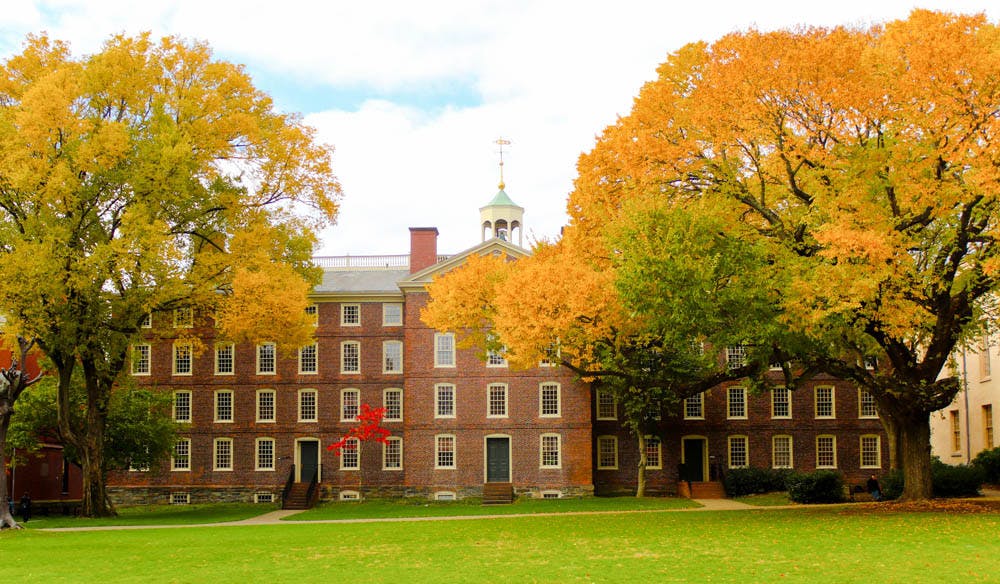Faculty members discussed requiring additional recommendation letters for the University’s tenure review process at Tuesday’s faculty meeting.
The proposed change to the tenure process would add two to three additional evaluation letters to a tenure candidate’s dossier, which is reviewed by TPAC, said Dean of the Faculty Kevin McLaughlin. The University’s current tenure process requires the Tenure, Promotions and Appointments Committee to find eight outside scholars within a candidate’s discipline to write letters evaluating their work.
Unlike the other eight evaluation letters, these additional letters would not be reviewed by the candidate’s department, McLaughlin said. This change would be in line with the tenure procedures of peer institutions, over half of which include an extra-departmental review process, he added.
Candidates undergoing tenure review would also be allowed to name specific individuals who might provide biased reviews and should not be contacted for evaluation letters.
Currently, requesting additional letters already occurs on an “ad hoc basis” if concerns about a particular candidate arise, McLaughlin said. The proposed change would make the tenure review process more consistent.
TPAC proposed these amendments to ensure the University’s tenure process is “fair, consistent and unbiased,” following recurring instances of lawsuits based on tenure rejection, McLaughlin said. “Almost every year we have legal action or the threat of legal action around tenure cases, and it almost always rests on consistency,” he added.
McLaughlin did not discuss specific cases, but in April, a University faculty member and her husband, another faculty member, filed a lawsuit against President Christina Paxson P’19 and the University over her tenure rejection, claiming age discrimination, The Herald previously reported.
“If we’re treating some people differently in a way that doesn’t look consistent and fair, especially if it looks like prejudice or bias, then we are exposing ourselves to risk,” McLaughlin said in the meeting.
He acknowledged concerns by faculty that this change “takes control of the tenure process away from the department” and discussed possible remedies. If significant issues about a candidate are raised following TPAC’s review of these additional letters, the committee could go back to the department to discuss these concerns, said Kristi Wharton, chair of TPAC and professor of biology.
Moving forward, McLaughlin will continue to discuss the proposed changes with the Faculty Executive Committee.
After McLaughlin and Wharton’s presentation, Title IX Program Officer Rene Davis provided an overview of the University’s 2019 Campus Climate Survey on Sexual Assault and Misconduct, a national survey organized by the Association of American Universities.
The survey, which was conducted from April to May 2019, allowed the University to gain an understanding of shifts in the presence of sexual and gender-based misconduct by comparing the results of the 2019 survey to those of the 2015 survey.
Overall, the 2019 survey showed a slight uptick in reports of sexual assault and misconduct. Between 2015 and 2019, reports of sexual assault increased slightly. Reports of intimate partner violence rose from 7.8 percent in 2015 to 9.5 percent in 2019, while reports of stalking increased from 4.2 to 6.3 percent.
Undergraduate women and individuals identifying as transgender, genderqueer, nonbinary or questioning experienced higher rates of non-consensual contact compared to other groups, Davis added.
Respondents also had the opportunity to report the demographic identity of perpetrators of sexual harassment. While the majority of offenders were other students, respondents also identified faculty and staff as perpetrators in some cases, Davis said. Specifically, female graduate students identified faculty at a higher rate than other respondents.
Looking forward, Davis will conduct a deeper dive into the data from the climate survey and will use these findings to inform the University’s policies and practices, she said. Davis also hopes to convene working groups to review trends related to sexual assault and misconduct and refine the University’s training and prevention efforts.
Associate Professor of History Jennifer Lambe also presented on the life and accomplishments of late Associate Professor of History Robert Douglas Cope, who passed away Oct. 6.
Faculty were also reminded to disclose research or scholarship-related involvement with foreign entities in accordance with federal mandates. Involvement with foreign entities includes collaboration with investigators outside of the United States, use of facilities or equipment at a foreign site and financial support or resources from a foreign entity, said Jill Pipher, vice president for research and professor of mathematics.





